In 2025, protecting just one device is like locking only your front door while leaving all the windows wide open. From our laptops and phones to smart TVs and tablets, our digital lives are spread across a dozen different screens. Finding the best VPNs with Multi-device Support is the key to securing your entire digital household without having to juggle multiple subscriptions.
As someone who manages the security for my own family’s ever-growing collection of gadgets, I’ve personally wrestled with the central question: Is a cheap “unlimited” plan a better value than a top-tier service with a generous, but fixed, number of connections? The answer isn’t always what you’d expect, and the biggest mistake is choosing a plan that doesn’t fit your family’s real-world needs.
In this value-focused guide, you will discover:
- The crucial difference between “unlimited” and “premium limited” VPN plans.
- Our top 5 picks, ranked by their true value for families and tech lovers.
- A real-world “family test” showing how these VPNs perform under pressure.
- Why a VPN on your router might be the smartest choice of all.
Don’t overpay for multiple plans or leave your family’s devices unprotected. Let me help you find the single, most cost-effective solution to secure every gadget you own.
Need to Protect Many Devices? Your Best Bets
- Surfshark – For Unlimited Devices on a Budget: Our top pick for unbeatable value. It protects every single device you own for one low price, making it perfect for large families.
- NordVPN – For Premium Performance (up to 10 devices): Ideal if you have fewer than 10 devices and your priority is top-tier speed and advanced security features.
- The Ultimate Solution (for unlimited devices): A VPN on your router. Connect a compatible router to a service like ExpressVPN to protect everything in your home with just one of your connection slots.
1. Our top 5 VPN picks for multiple devices in 2025
Now, let’s look at the specific VPNs that excel at protecting a connected household. We’ve ranked them based on their connection limits, performance under load, and overall value.
To truly illustrate the value, we’ve added a “Cost per Device” column, calculating the monthly cost for protecting 10 devices based on each provider’s 2-year plan price. This really highlights the economic advantage of the “unlimited” plans.
| Rank | Best For | Simultaneous Connections | Cost per Device* (10 Devices) |
|---|---|---|---|
| #1 – Surfshark | Overall Value & Families | Unlimited | ~$0.25 / mo |
| #2 – IPVanish | Another Great “Unlimited” Option | Unlimited | ~$0.27 / mo |
| #3 – Private Internet Access | Budget-Friendly & Unlimited | Unlimited | ~$0.21 / mo |
| #4 – NordVPN | Premium Performance | 10 | ~$0.39 / mo |
| #5 – ExpressVPN | Ease of Use & Router Setup | 8 | ~$0.83 / mo |
*Note: Based on standard 2-year plan pricing. For unlimited plans, the cost-per-device approaches zero as you add more devices. ExpressVPN’s limit is 8, so the cost is calculated on 8 devices.
A high connection limit is useless if the service grinds to a halt when everyone is online. I put these VPNs to the test in a real-world, multi-device environment to see how they hold up.
1.1. #1 – Surfshark
Surfshark brilliantly solves the biggest headache for modern families and gadget lovers: Device limits. Its unlimited simultaneous connections policy is not a gimmick; it’s a core feature that provides incredible freedom and value. With a single, affordable subscription, you can install and use it on every single phone, laptop, tablet, and smart TV in your home without ever thinking twice.
PROS
- Truly unlimited connections offer unbeatable value.
- Extremely affordable on long-term plans.
- Stable performance even with many devices connected.
CONS
- Speeds, while great, can be less consistent than NordVPN’s peak performance.
- Lacks some of the more advanced features of premium competitors.
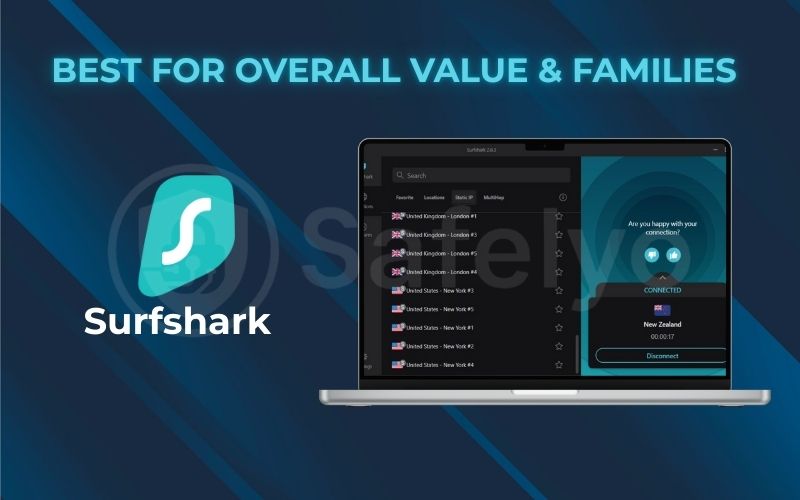
Hands-on experience
To push it to its limits, my family and I connected 12 devices to Surfshark simultaneously. This included a Windows PC for gaming online and a MacBook for video calls. Additionally, there were two iPhones scrolling through social media, an Android tablet streaming YouTube TV, and a Fire TV Stick streaming Netflix in 4K. I was genuinely impressed. The performance was remarkably stable across all devices, with no one complaining about lag or buffering. The connection held steady, proving that their network can handle the demands of a modern, connected household.
Feature spotlight - Account Management
The user dashboard on their website is clean and simple. While you can’t remotely disconnect a specific device (a feature I’d love to see), the unlimited nature of the plan makes this less of an issue. You never have to worry about kicking one device off to make room for another.
Surfshark – Best for overall value & families
For unbeatable value and the freedom to protect everything you own without counting, Surfshark is the clear winner for most multi-device users. It’s the simple, cost-effective solution to a complex problem.
1.2. #2 – IPVanish
IPVanish is another top-tier provider that offers the freedom of unlimited simultaneous connections. It’s a fantastic alternative to Surfshark, especially for users in the US, as it has a strong reputation for fast speeds on North American servers. Like Surfshark, it allows you to secure every gadget in your home on a single plan.
PROS
- Unlimited simultaneous connections.
- Historically strong speeds, especially in the US.
- Owns its entire server network, which is a plus for security.
CONS
- The app’s design feels a bit more dated than Surfshark’s modern interface.
- Its unblocking ability with streaming services can be less consistent than that of other top providers.
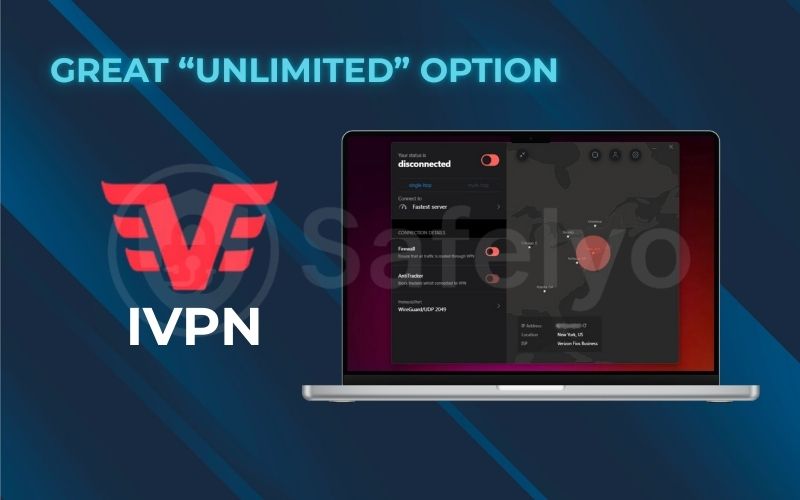
Hands-on experience
We loaded up IPVanish on a similar array of devices. The performance was very strong, and we had no trouble with multiple streams and browsing sessions at once. Their apps are straightforward to use across all platforms (Windows, macOS, iOS, Android), providing a consistent experience whether you’re on a laptop or a phone.
Feature spotlight - In-app device management
A small but welcome feature is that from within the IPVanish app, you can sometimes see a count of your active connections. It’s a simple touch, but it helps you keep track of just how many devices your single subscription is protecting.
IPVanish – Another great “unlimited” option
IPVanish is a rock-solid choice for anyone seeking unlimited connections. It offers a fast, reliable service that can easily handle the demands of a multi-device household, making it a great alternative to Surfshark.
1.3. #3 – Private Internet Access (PIA)
Previously known for its 10-device limit, Private Internet Access has upgraded its offering. It now includes unlimited simultaneous connections, making it one of the best value propositions on the market. It combines this with highly customizable apps and a proven no-logs policy, making it a fantastic choice for tech-savvy families.
PROS
- Now offers unlimited connections, providing incredible value.
- Very affordable long-term plans.
- Open-source apps for verifiable security.
CONS
- The sheer number of settings can be intimidating for absolute beginners.
- The interface is more functional than flashy.
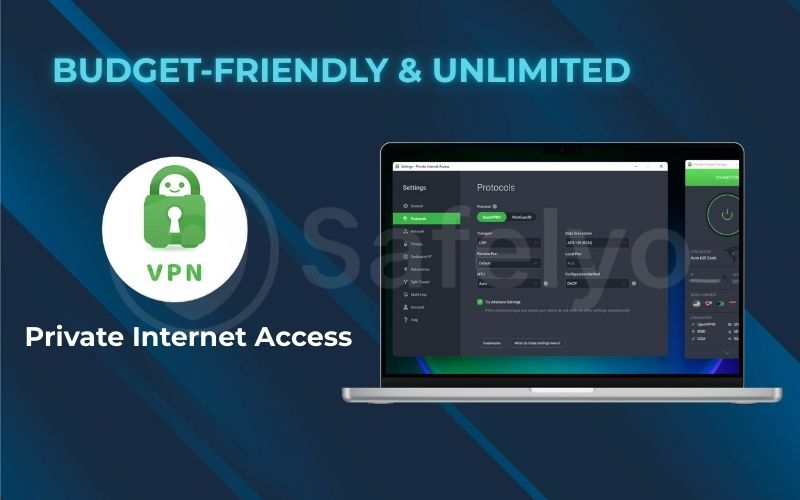
Hands-on experience
PIA has a long-standing reputation for being a reliable workhorse, and it handled our multi-device stress test with ease. What I appreciate as a more technical user is that while the apps are simple on the surface, they offer a huge amount of customization under the hood. This means I can use the simple, one-click connection on my family’s devices, while still being able to fine-tune the settings on my own machine.
Feature spotlight - Open Source apps
PIA’s commitment to transparency is a huge plus. All of their apps are 100% open source, meaning anyone can inspect the code to verify its security. For a service that you’re trusting with the data of your entire family, this provides an extra layer of peace of mind.
Private Internet Access (PIA) – Budget-friendly & unlimited
With its recent move to unlimited connections, PIA has become a top-tier contender for the best multi-device VPN. It offers a fantastic combination of value, performance, and customizable security that’s hard to beat.
1.4. #4 – NordVPN
While it doesn’t offer unlimited connections, NordVPN’s limit of 10 simultaneous devices is still incredibly generous and more than enough for most individuals and families. What you get in exchange for that limit is access to one of the fastest, most feature-rich, and most secure VPNs on the planet. This is the “quality over quantity” choice.
PROS
- Industry-leading speeds and security features.
- Polished, easy-to-use apps on every platform.
- Unique Meshnet feature for linking your own devices.
CONS
- Connection limit is capped at 10 devices.
- It can be more expensive than the unlimited providers.
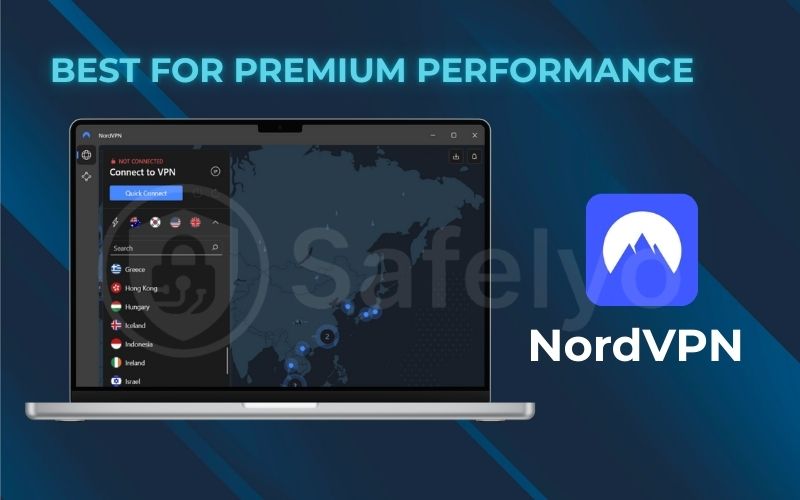
Hands-on experience
NordVPN feels like a premium product on every device. The apps are polished, fast, and packed with useful features. In a household setting, a feature like Threat Protection is fantastic, as it blocks malware and trackers at the VPN level, protecting every family member, regardless of their browsing habits. The speeds are consistently at the top of our charts, meaning that even with 8-10 devices connected, you’re unlikely to experience any slowdowns.
Feature spotlight - Meshnet
Meshnet is a unique feature that allows you to create your own secure, private network and link up to 60 devices, even if they’re on different internet connections. For a family, this is amazing for securely sharing files between computers or for a student wanting to access their home media server from their dorm room. It’s an advanced multi-device feature that no one else offers.
NordVPN – Best for premium performance
If you demand the absolute best performance and are confident that 10 connections are enough to cover your household’s needs, NordVPN is the superior choice. It’s a premium experience that delivers on all fronts.
1.5. #5 – ExpressVPN
ExpressVPN offers a limit of 8 simultaneous connections, which is lower than the others on this list. However, it earns its spot for two key reasons: Its unparalleled ease of use and its “secret weapon” for covering unlimited devices – its custom router firmware.
PROS
- The easiest-to-use apps of any VPN.
- The limit of 8 connections is lower than that of competitors.
- Rock-solid reliability.
CONS
- The limit of 8 connections is lower than that of competitors.
- The most expensive VPN on our list.
- A best-in-class router app can cover unlimited devices at home.
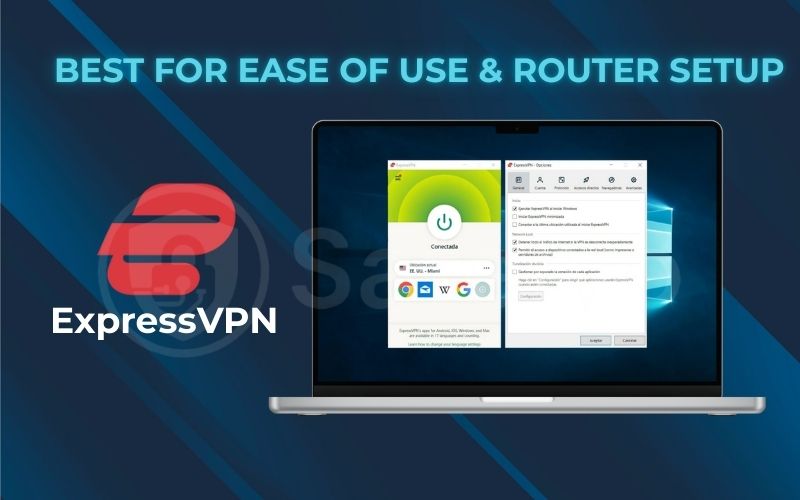
Hands-on experience
The beauty of ExpressVPN is its simplicity. It’s the VPN I would give to a non-technical family member, knowing they could use it without any confusion. The apps are virtually identical across all platforms, offering a consistent and foolproof “one-click” experience.
Feature spotlight - Router Support
While 8 connections might seem limiting, installing ExpressVPN on a compatible router is the ultimate workaround. The entire router setup counts as just one of your eight connections. However, it protects every device connected to your home Wi-Fi, from your smart TV to your game console. Their custom firmware makes this setup process dramatically easier than any other provider, turning it into a viable option even for non-experts.
ExpressVPN – Best for ease of use & router setup
For users who prioritize a seamless, user-friendly experience or who are interested in the ultimate solution of a router VPN, ExpressVPN is an excellent, albeit premium, choice. Its router functionality effectively makes its 8-device limit irrelevant for home use.
2. Unlimited connections vs. Premium quality
Before we look at the specific providers, let’s tackle the central debate that every multi-device user faces: Should you go for a VPN offering “unlimited” connections or a top-tier VPN with higher performance but a fixed limit?
As someone who has tested both types of services extensively, I can tell you that the “best” choice really depends on how you define value. Here’s a quick comparison of the two philosophies.
| Philosophy | “Unlimited” Champions | “Quality over Quantity” Contenders |
| Example Providers | Surfshark, IPVanish | NordVPN, ExpressVPN |
| Primary Strength | Unbeatable value for many devices. | Peak performance and advanced features. |
| Connection Limit | None. Protect everything you own. | Typically, 8-10 devices at once. |
| Best For… | Large families, gadget lovers, budget-conscious users. | Power users, speed enthusiasts, and smaller households. |
Now, let’s dive deeper into the pros and cons of each approach.
The "Unlimited" Champions (e.g., Surfshark, IPVanish)
These providers have built their brand on a simple, powerful promise: one subscription protects everything. No counting, no juggling, no logging out of one device to log in on another.
- Pros: The value proposition is undeniable, especially for large families or individuals with a huge number of gadgets. The peace of mind of knowing you’ll never hit a limit is a major selling point. It’s the simplest, most straightforward solution for a connected household.
- Cons: To offer this at such a low price, there can sometimes be minor trade-offs. While the performance is generally excellent, it might not always match the absolute peak speeds of the top-tier competition during busy hours.
The "Quality over Quantity" Contenders (e.g., NordVPN, ExpressVPN)
These are the premium players in the market. They focus on delivering the absolute fastest speeds, the most advanced security features, and the most polished apps, but they cap the number of devices you can connect at once.
- Pros: You often get the best possible performance. In my tests, these services consistently deliver the highest speeds and the most reliable connections. Their apps are also incredibly refined and packed with cutting-edge features.
- Cons: You have a hard limit. While a limit of 10 devices is actually more than enough for most households, you do have to be aware of it. If you’re a true gadget enthusiast with 15+ personal devices, you might feel constrained.
Safelyo’s Verdict
After years of managing my family’s digital security, here is my honest take: for the vast majority of families and individuals, a plan with unlimited connections like Surfshark offers unbeatable, real-world value. The freedom and simplicity it provides are a game-changer.
For the power user or performance enthusiast, a premium option like NordVPN can be a better fit. This is especially true for those who demand the best speeds and find 10 connections sufficient for their needs.
3. The “Smith family” test: A real-world usage scenario
Numbers on a page are one thing, but what does using a VPN for multiple devices look like in a real, chaotic family household? To illustrate the value, we imagined a typical evening for the fictional “Smith family,” putting our top pick, Surfshark, to the test.
Here’s the scene: It’s 7 PM on a Tuesday.
- In the living room, Dad wants to watch a UK-exclusive soccer match. He’s using the Surfshark app on their Smart TV to connect to a server in London.
- In the home office: Mom is finishing up some work. She has Surfshark running on her company laptop to encrypt her connection on the home Wi-Fi, keeping sensitive work data secure.
- In his bedroom: Their teenage son, Mark, is deep into an online gaming session on his Windows PC. He has the VPN on to protect himself from potential DDoS attacks from salty opponents.
- In her bedroom, their teenage daughter, Chloe, is doing two things at once. She’s watching the latest season of a show that’s only on US Netflix on her iPad, while simultaneously scrolling through Instagram and TikTok on her iPhone.
THE RESULT:
That’s five different devices, in four different rooms, performing five different online activities – two of which are streaming international HD video – all at the exact same time.
With a single Surfshark account, this entire scenario is possible without a single hiccup. No one has to ask anyone else to log off. No one has to compromise their security or their entertainment. Dad gets his game, Mom secures her work, and the kids get their entertainment and protection.
This is the real-world power and freedom that a VPN with unlimited connections provides. It’s not just a feature; it’s a solution that adapts to the chaos of modern family life.
4. The ultimate solution: Using a VPN on your router
Want to completely bypass the debate over device limits and protect everything in your home with one elegant solution? The most powerful method for any multi-device user is to install the VPN directly on your Wi-Fi router.
From my experience, this is the true “set it and forget it” approach to home network security.
How it works (and why it's so powerful):
Instead of installing a separate app on each of your gadgets, you configure the VPN on the central hub of your home network – the router. Once it’s set up, every single device that connects to your Wi-Fi is automatically routed through the secure VPN tunnel. This includes:
- Your laptops, phones, and tablets.
- Smart TVs (like Samsung, LG) that can’t run VPN apps themselves.
- Game consoles (PlayStation, Xbox, Nintendo Switch).
- Smart home devices (like smart speakers, security cameras, etc.).
Best of all, this entire, all-encompassing setup counts as only one of your VPN’s simultaneous connections. This means that with a provider like NordVPN (10-device limit) or ExpressVPN (8-device limit), you can protect numerous devices at home while still having plenty of connection slots available for your mobile devices when you’re on the go.
>> Check out for: How to Set Up a VPN on a Router (Full Guide for 2025)
Which VPNs are best for this?
While this is a more advanced setup, some providers make it much easier than others. As I mentioned in our dedicated VPN for Routers guide, ExpressVPN is the top choice due to its custom, user-friendly router firmware. Private Internet Access is also an excellent option for its incredibly detailed setup guides for a wide range of router models.
Safelyo’s expert insight: Look beyond the number
While the number of simultaneous connections is important when selecting a VPN for multiple devices, it’s also essential to consider the quality and consistency of the apps for each device.
A VPN that supports unlimited devices is only truly valuable if its apps for Windows, macOS, Android, iOS, and Fire TV are all stable, fast, and easy to use. I’ve seen some smaller providers offer unlimited connections, but have buggy or outdated apps on certain platforms. This is why we’ve focused on providers like Surfshark and IPVanish, which offer unlimited connections and uphold a high standard across their app ecosystem. This ensures a great experience, regardless of the device you’re using.If one person in your house is downloading a huge file, other users might experience slower speeds, but this is due to your home’s total bandwidth being used, not a limitation of the VPN itself.
5. FAQ about VPNs with Multi-device Support
Here are the direct answers to the most common questions about using a single VPN subscription on all your family’s gadgets.
What are the best VPNs with multi-device support in 2025?
The best choice depends on your priority:
- For Best Value: Surfshark is our top recommendation. It offers unlimited simultaneous connections for a very low price, making it perfect for large families.
- For Best Performance: NordVPN is the best choice if you have 10 devices or fewer and prioritize top-tier speed and advanced security features.
Which VPN allows multiple devices?
Virtually all modern VPNs allow you to install and use their service on multiple devices. The key difference is the limit on how many can be connected at the same time. Services like Surfshark, IPVanish, and Private Internet Access are notable for offering unlimited simultaneous connections.
How many devices can I have my VPN on?
The number of devices you can use simultaneously depends on your provider. Here are the limits for our top picks:
- Surfshark, IPVanish, Private Internet Access: Unlimited devices.
- NordVPN: 10 devices.
- ExpressVPN: 8 devices.
Can I use NordVPN on multiple devices?
Yes, you can use NordVPN on up to 10 devices at the same time with a single subscription. This is generally more than enough to cover the daily-use devices for most individuals and families.
Can I use proton VPN on multiple devices?
Yes, the paid version of Proton VPN allows you to connect up to 10 devices simultaneously. Their free plan is limited to just one connection at a time.
Can I share my VPN account with friends and family?
Most VPN providers’ terms of service state that a single subscription is intended for use within a single household. While it is technically possible to share your login details with someone outside your home, it is generally discouraged and could potentially lead to your account being flagged for abuse.
Does using more devices slow down the VPN?
No, not directly. The VPN’s maximum speed is shared across all your connected devices, just like your regular home internet bandwidth. If someone in your household is downloading a large file, other users may experience slower speeds. However, this is due to the total bandwidth being used at home, not a limitation of the VPN itself.
6. Conclusion
In today’s hyper-connected world, securing just one device is like locking only your front door while leaving all the windows open. A VPN for multiple devices is the key to securing your entire digital home, protecting your whole family from online threats with one simple, cost-effective solution.
To ensure you choose the best plan for your needs, here are the key takeaways:
- Surfshark is our top pick for its unbeatable value and true unlimited connections, making it perfect for most families.
- “Unlimited” isn’t always necessary; premium VPNs like NordVPN offer 10 connections, which is plenty for most users who prioritize performance.
- Consider a VPN on your router for the ultimate, all-encompassing protection that uses only one connection slot.
- Always choose a plan that can comfortably cover all the devices you and your family use on a daily basis.
Don’t juggle multiple accounts or leave your family’s gadgets unprotected. Investing in a single, high-quality multi-device VPN is the simplest and most effective way to achieve digital peace of mind. Now that you’ve found the right plan for all your gadgets, explore other guides on the Best VPN from Safelyo for specific devices, like smart TVs and game consoles, to get the most out of your subscription.


